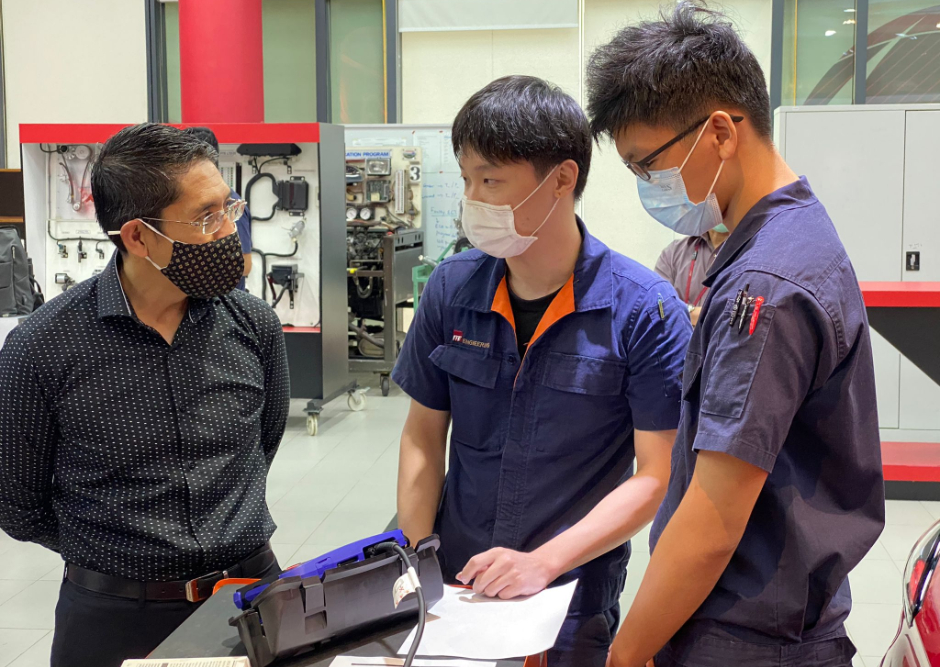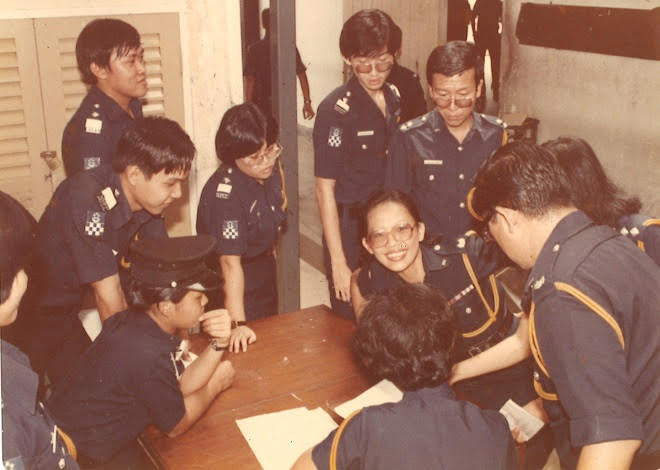When I was young, money had always been tight in my family, so during my pre-university days, I would spend my weekends selling drinks at the Singapore Turf Club to help with the household expenses.
I thought I was coping quite well in my studies, but when the A-level results were released, I learned that I didn’t do well enough for the university programme I had set my heart on. I was disappointed of course, as I knew I could do better. Was it because my focus was divided between school and work? I couldn’t say for sure, but it didn’t change the fact that I was standing at a crossroads: “Should I accept the course that I was assigned, or repeat a whole year of my A-levels again? Do I want to sell drinks for one more year?” By then, I had also already enlisted for National Service (NS).
This was just one of the memorable checkpoints on my academic journey. I knew I could do better at my exams and after much thought, I decided to sit for my A levels again as a private candidate. What followed were many nights preparing for my examinations while doing my NS training in the day. It was really tough, so tough that I came down with a serious chest infection leading up to the exam season. But the sacrifices paid off; I achieved better results!
I recall that the first thing my father asked me when I registered for university was how much it would cost. He was worried he could not afford the fees and additional expenses. I told him not to worry – I would give private tuition to fund my expenses through my university years and not be a burden to my parents.
Was the hard work and trouble worth it? I say 100% yes. I appreciated the training of the mind and the professional opportunities that my education availed to me. There was also the satisfaction of pursuing the social work course I wanted and accomplishing my dreams.
Four reasons to stay the course
These days, when young people tell me their education journey may be curtailed for various reasons, whether to supplement the family income or because they lack motivation, I empathise with them and encourage them to persevere. They should find ways to push on in their learning and set their sights on the long-term, because learning should be a lifelong pursuit.

 Over 40 engagement sessions were held this year with over 1,200 members of the public as part of the Review of Opportunities and Pathways in Applied Education chaired by Dr Maliki. A key development is the unveiling of the new ITE curricular structure (photo above), which gives all students the opportunity to pursue a Higher Nitec, gain deeper industry-relevant skills, and have better job prospects.
Over 40 engagement sessions were held this year with over 1,200 members of the public as part of the Review of Opportunities and Pathways in Applied Education chaired by Dr Maliki. A key development is the unveiling of the new ITE curricular structure (photo above), which gives all students the opportunity to pursue a Higher Nitec, gain deeper industry-relevant skills, and have better job prospects.
I have met many students at the Institute of Technical Education (ITE) who tell me that they need to work to support themselves and/or their families. My heart goes out to them as I know what it is like. We hope their studies will not be affected by their family’s financial situation. To them, I want to say, we are here for you; we will support you with the resources you need – financial assistance, academic support and more.
Fundamentally, we will provide a stronger foundation for further knowledge and skills upgrading with the introduction of changes to the ITE curricular structure for selected courses which I announced in April this year; full implementation for all courses is expected by the 2026 intake.
Let me voice the concerns of students past and present and how these changes will address them:
1. “My course takes too long.”
ITE certificate courses typically comprise two years of National ITE Certificate (Nitec) training followed by two years of Higher Nitec training, which adds up to four years. Under the enhanced curricular structure, ITE has streamlined its courses and introduced more learning scaffolds so that students can obtain their Higher Nitec in three years. The enhanced curricular structure also provides flexibility as some students with the right aptitude may take only two years.
2. “I didn’t get into the course I wanted at Higher Nitec after graduating from Nitec, so I dropped out.”
After completing their Nitec training, students had to apply again for admission to a Higher Nitec programme, and some were assigned to a different area of learning. ITE has since streamlined the Nitec and Higher Nitec curricula so that students admitted to ITE can progress seamlessly through training at the Nitec and Higher Nitec levels in the same sector.
3. “I need to start working soon.”
Your ITE education will better prepare you for work. The new three-year curricula will deepen your skills and competencies, and equip you for the workplace in a shorter span of time.
The two stints of industry attachments are now integrated, with the second attachment building on the learning experiences of the first. This also allows for more close mentoring by workplace mentors. This is a power-up that no one should miss out on by leaving a programme ahead of time.
Do not forget that ITE also offers Work-Study Diplomas (WSDips), which allow our ITE graduates to train in authentic work environments and gain valuable work experience and industry exposure during their diploma course. WSDip graduates have shared with me that the experience has enabled them to enter the workforce with greater confidence and with better employability prospects.
4. “ITE is for those who can’t make it.”
Stigmas such as this are unfounded and unfair. They undermine the concerted and considerable efforts put in by our ITE educators to support a diverse range of students with different learning styles and personal aspirations.
ITE’s unique practice-oriented pedagogy helps N-Level and O-Level students to extend their learning in programmes that are relevant to industry needs. Our ITE graduates are equipped with work-ready skills and are sought after by the industry for their technical competencies.
Additionally, ITE graduates can go on to pursue skills upgrading beyond their Nitec or Higher Nitec course. They can pursue ITE’s Technical Diplomas and Work-Study Diplomas, while others obtain polytechnic diplomas or university degrees. Many choose to gain work experience and revisit their academic journeys later in life, returning to ITE after discovering where their passions lie, to pursue new qualifications, improve their career prospects, or simply to refresh their skills.
ITE is a place where students acquire skills and confidence to take on different job roles in industry. It is also a place where students receive the care and guidance needed to flourish and grow. I have met many ITE graduates who are confident and successful in what they do, and are making important and meaningful contributions to our community.
I hope we can work together as a society to support all students in furthering and fulfilling their aspirations, whether through ITE or other education pathways. Perseverance is key! In a future where global competition for talent is the order of the day, we strive to develop every young Singaporean talent to succeed.
A version of this commentary first appeared in Malay in Berita Harian.




.jpg)

